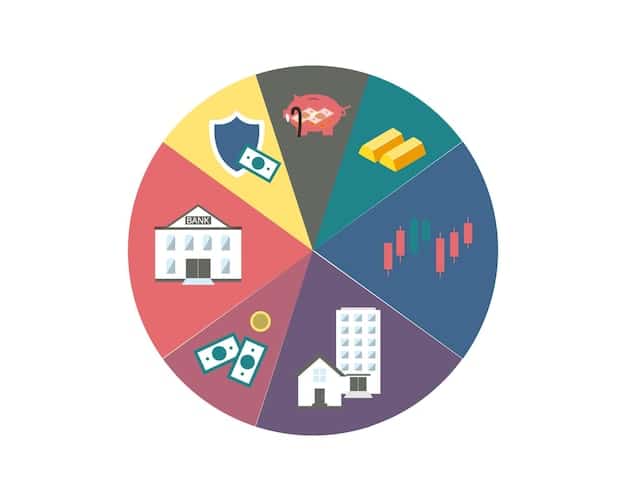Adjusting Your Financial Plan for the Projected 3.4% Inflation in 2025

Adjusting your financial plan for the projected 3.4% inflation rate in 2025 involves reassessing investment strategies, budget allocations, and long-term financial goals to mitigate the impact of rising costs and maintain your purchasing power.
As we look ahead to 2025, economists are projecting an inflation rate of 3.4%. This means the cost of goods and services is expected to rise, impacting your purchasing power. It’s crucial to understand how to adjust your financial plan for the projected 3.4% inflation rate in 2025 to protect your savings and achieve your financial goals.
Understanding the Projected Inflation Rate of 3.4%
Before diving into adjustments, it’s essential to understand what a 3.4% inflation rate means for your finances. Inflation erodes the value of money, reducing what you can buy with the same amount of dollars. Knowing this allows you to create appropriate strategies.
What does 3.4% Inflation mean for Consumers?
A 3.4% inflation rate means that, on average, the prices of goods and services will increase by 3.4% over the year. This can significantly impact a household’s budget.
How is Inflation Measured?
Inflation is typically measured using the Consumer Price Index (CPI), which tracks the average change in prices paid by urban consumers for a basket of goods and services.

Understanding these aspects of inflation measurement is critical. Without the basic knowledge, it may be difficult to navigate the decisions needed to secure your desired lifestyle. Once we understand the basics, we can better prepare ourselves for the future.
- Budgeting Challenges: Consumers may find it harder to afford the same goods and services.
- Savings Impact: The real value of savings can decrease if interest rates don’t keep pace with inflation.
- Investment Returns: Investment returns need to outpace inflation to maintain or grow wealth.
In conclusion, understanding the dynamics of a 3.4% inflation rate is the first step in effectively adjusting your financial plan to mitigate its impact on your purchasing power and financial stability.
Reassessing Your Current Budget
The first step in adapting your financial plan for inflation is to reassess your current budget. Analyze your spending habits and identify areas where you can cut back or reallocate funds to better manage rising costs.
Tracking Your Expenses
Use budgeting apps, spreadsheets, or simple notebooks to track where your money is going each month. This provides a clear picture of your spending habits.
Identifying Non-Essential Expenses
Once you’ve tracked your expenses, categorize them into essential and non-essential items. Look for areas where you can reduce spending, such as entertainment, dining out, or subscriptions.
- Negotiate Bills: Contact service providers to negotiate lower rates on bills such as internet, phone, and insurance.
- Reduce Food Waste: Plan meals, buy in bulk (when appropriate), and use leftovers to minimize food waste and save money on groceries.
- Energy Efficiency: Implement energy-efficient practices to lower utility bills.
Regularly reviewing and adjusting your budget is crucial for staying on track and maintaining financial stability during inflationary periods. By making small changes and being mindful of your spending, you can effectively manage rising costs and protect your financial well-being.
Adjusting Your Investment Strategy
Inflation can significantly impact your investment portfolio. To mitigate its effects, consider adjusting your investment strategy to include assets that tend to perform well during inflationary periods. Diversification holds the power to stabilize any portfolio.
Inflation-Resistant Assets
Consider investing in assets that historically have shown to maintain or increase their value during inflation, such as real estate, commodities, and Treasury Inflation-Protected Securities (TIPS).
Diversifying Your Portfolio
Spreading your investments across different asset classes can help reduce risk and improve returns. Diversification is about not putting all your eggs in one basket.

These strategic approaches can help you combat inflation and protect your investment returns. By allocating a portion of your portfolio to these assets, you can potentially maintain or even increase your wealth during periods of rising prices.
- Real Estate: Historically, real estate values tend to rise with inflation.
- Commodities: Investments like gold and silver are often seen as a hedge against inflation.
- Stocks: Certain stocks, such as those in the energy or materials sectors, may perform well during inflation.
Adjusting your investment strategy to include inflation-resistant assets and diversification can help safeguard your portfolio and ensure long-term financial growth. Continuously monitor your investments to ensure they continue to align with your goals.
Refinancing Debt and Managing Liabilities
High inflation environments may affect the interest you pay on your debts, be they loans or credit cards. Refinancing might be a good alternative for you.
Evaluate your Debt
Take a thorough look at all debts, and the respective interest rates. Knowing this data is vital as you construct your mitigation strategy.
Consolidation
Consolidate your debts in order to negotiate better terms and focus on just on payment.
Debt is a complex topic, so make sure you consult with a financial advisor, if necessary.
- Credit Card Debt: High Credit Card Debt might require you to make a balance transfer to take advantage of lower interest rates.
- Student Loans: Look for better payment plans, or refinancing if possible.
- Personal Loans: Assess different scenarios and evaluate potential gains to be realised in the future.
Managing your debt can mean different things to different people, however most experts agree on one thing: the less amount of debt the better. Consult with an expert when in doubt, and always make informed decisions.
Strategies for Increasing Income
Inflation can stretch your budget thin, making it difficult to cover expenses and save for the future. One effective way to combat this is by increasing your income streams, providing you with more financial flexibility and security.
Negotiating a Raise at Work
Research industry standards and performance metrics to make a strong case for a raise. Highlight your contributions and accomplishments to demonstrate your value to the company.
Exploring Freelance Opportunities
Utilize your skills and expertise to offer freelance services in your field. Websites like Upwork and Fiverr connect freelancers with potential clients seeking various services.
Increasing your income can provide a buffer against inflation and improve your overall financial health. Always stay informed, be prepared, and continuously seek ways to enhance your financial well-being.
- Part-Time Employment: Consider taking on a part-time job to supplement your income. Retail, hospitality, and customer service industries often offer flexible hours and immediate employment opportunities.
- Monetizing Hobbies: Turn your hobbies or passions into a source of income. Sell handmade crafts on Etsy, offer photography services, or teach online classes.
- Investing in Education: Enhance your skills and knowledge by taking courses or workshops. Acquire new qualifications and increase your earning potential in your current or future career path.
Increasing your income can provide a buffer against inflation and improve your overall financial health. Always stay informed, be prepared, and continuously seek ways to enhance your financial well-being.
Long-Term Financial Goals and Inflation
Inflation can significantly impact your long-term financial goals, such as retirement, education funding, and homeownership. Adjusting your strategies now can help ensure you stay on track to achieve these objectives despite rising prices.
Retirement Planning
Assess your retirement savings and adjust your contributions to account for inflation. Use retirement calculators to project future expenses and ensure your savings will cover them.
Education Funding
For those saving for college, consider inflation-adjusted investment options like 529 plans. Adjust your savings contributions based on projected tuition increases.
Regularly reviewing and adjusting your long-term financial plans is essential for maintaining progress toward your goals despite economic fluctuations. Consult with a financial advisor to ensure your strategies align with your objectives.
- Homeownership: If you plan to buy a home, factor in rising property values and interest rates. Consider adjusting your budget and savings goals to accommodate these increased costs.
- Healthcare Costs: Plan for potential increases in healthcare expenses. Explore health savings accounts (HSAs) and consider long-term care insurance to mitigate future financial burdens.
- Estate Planning: Update your estate plan to reflect changes in asset values and tax laws. Ensure your beneficiaries are protected and your assets are distributed according to your wishes.
Regularly reviewing and adjusting your long-term financial plans is essential for maintaining progress toward your goals despite economic fluctuations. Consult with a financial advisor to ensure your strategies align with your objectives.
| Key Point | Brief Description |
|---|---|
| 💰 Budgeting | Reassess spending to cut non-essential expenses. |
| 📈 Investments | Diversify portfolio with inflation-resistant assets. |
| 💳 Debt | Refinance debts to secure lower interest rates. |
| 💼 Income | Explore additional income sources. |
Frequently Asked Questions (FAQ)
▼
Inflation erodes your purchasing power, meaning you can buy less with the same amount of money. This can impact your ability to meet expenses and save.
▼
Invest in assets that tend to hold or increase their value during inflation, such as real estate or commodities, to safeguard your savings.
▼
Yes, it’s crucial to assess your retirement savings and increase contributions to account for inflation and ensure your savings last.
▼
Yes, government programs such as Social Security offer cost-of-living adjustments (COLA) to help beneficiaries cope with rising inflation.
▼
It’s advisable to review your financial plan more frequently, at least quarterly, to make timely adjustments based on the evolving economic situation.
Conclusion
Adjusting your financial plan for a projected inflation rate requires a proactive and comprehensive approach. By understanding the impact of inflation, reassessing your budget, adjusting your investment strategy, managing debt, and increasing income, you can effectively protect your financial well-being and achieve your long-term goals.





